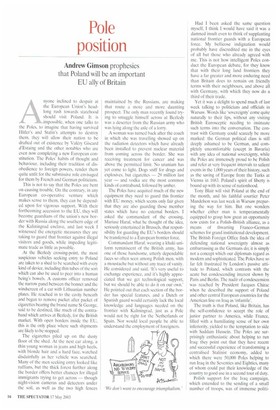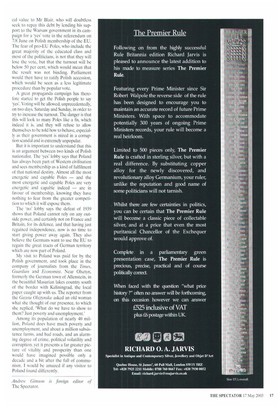Pole position
Andrew Gim son prophesies that Poland will be an important EU ally of Britain Anyone inclined to despair at the European Union's headlong rush towards statehood should visit Poland. It is impossible, when one talks to the Poles, to imagine that having survived Hitler's and Stalin's attempts to destroy them, they will allow their nation to be drafted out of existence by Valery Giscard d'Estaing and the other notables who arc even now completing a new European constitution. The Poles' habits of thought and behaviour, including their tradition of disobedience to foreign powers, render them quite unfit for the submissive role envisaged for them by French and German politicians.
This is not to say that the Poles are bent on causing trouble. On the contrary, in any European co-operative venture which makes sense to them, they can be depended upon for vigorous support. With their forthcoming accession to the EU. they will become guardians of the union's new border with Russia along the southern edge of the Kaliningrad enclave, and last week I witnessed the energetic measures they are taking to guard that frontier against illegal visitors and goods, while impeding legitimate trade as little as possible.
At the Bezledy crossing-point, the most suspicious vehicles seeking elm), to Poland are taken to a shed to be searched with every kind of device, including thin tubes of the sort which can also be used to peer into a human being's bowels. A customs officer removed the narrow panel between the bonnet and the windscreen of a car with Lithuanian number plates. He reached in to the cavity beneath and began to remove packet after packet of cigarettes bearing the brand name St George, said to be destined, like much of the contraband which arrives at Bezledy, for the British market. With open borders inside the EU, this is the only place where such shipments are likely to be stopped.
The cigarettes piled up on the dusty floor of the shed. At the next car along, a thin young woman in jeans and high heels, with blonde hair and a hard face, watched disdainfully as her vehicle was searched. Many of the men seeking entry looked like ruffians, but the thick forest further along the border offers better chances for illegal immigrants trying to get across — though night-vision cameras and detectors under the soil, as well as the two high fences maintained by the Russians, are making that route a more and more daunting prospect. The only man recently found trying to smuggle himself across at Bezledy was a deserter from the Russian army who was lying along the axle of a lorry.
A woman was turned back after the coach in which she was travelling showed up on the radiation detectors which have already been installed to prevent nuclear material from coming across the border. She was receiving treatment for cancer and was above the permitted limit. No uranium has yet come to light. Dogs sniff for drugs and explosives, but cigarettes — 29 million last year — and vodka are the most common kinds of contraband, followed by amber.
The Poles have acquired much of the new equipment they need to guard this frontier with EU money, which seems only fair given that they are also guarding those member states which have no external borders. I asked the commandant of the crossing, Mariusz Haraf, what he thought of the idea, seriously entertained in Brussels, that responsibility for guarding the EU's borders should be transferred to a European frontier force.
Commandant Haraf, wearing a khaki uniform reminiscent of the British army, has one of those handsome, utterly dependable faces so often seen among Polish men, with a moustache but without any trace of vanity. He considered and said, 'It's very useful to exchange experience, and it's highly appreciated that we get technological support, but we should be able to do it on our own.' He pointed out that each section of the border has special features, and a Dutch or Spanish guard would certainly lack the local knowledge and languages needed on the frontier with Kaliningrad, just as a Pole would not be right for the Netherlands or Spain. Nor would local people be able to understand the employment of foreigners. Had I been asked the same question myself, I think I would have said it was a damned insult even to think of supplanting national frontier guards with a European force. My bellicose indignation would probably have discredited me in the eyes of all but those who already agreed with me. This is not how intelligent Poles conduct the European debate, for they know that with their long land frontiers they have a far greater and more enduring need than Britain does to remain on friendly terms with their neighbours, and above all with Germany, with which they now do a third of their trade.
Yet it was a delight to spend much of last week talking to politicians and officials in Warsaw. Words like 'sovereignty' come quite naturally to their lips, without any visiting British Eurosceptic needing to insinuate such terms into the conversation. The contrast with Germany could scarcely be more marked: the German political class is still deeply ashamed to be German, and completely uncomfortable (except in Bavaria) with any idea of national sovereignty, while the Poles are immensely proud to be Polish and refer at very frequent intervals to salient events in the 1,000 years of their history, such as the saving of Europe from the Turks at Vienna in 1683. Poland's spirit of liberty is bound up with its sense of nationhood.
Tony Blair will visit Poland at the end of the month, and his faithful courtier Peter Mandelson was last week in Warsaw preparing the way for him. But one wonders whether either man is temperamentally equipped to grasp how great an opportunity now exists for a Polish-British alliance, as a means of thwarting Franco-German schemes for grand institutional development. The British Foreign Office finds the idea of defending national sovereignty almost as embarrassing as the Germans do; it is simply not a concept which our diplomats regard as modern and sophisticated. The Poles have so far felt frustrated by London's passive attitude to Poland, which contrasts with the acute but condescending interest shown by Paris and Berlin. The nadir of condescension was reached by President Jacques Chirac when he described the support of Poland and other central European countries for the American line on Iraq as 'infantile'.
The truth is that Poland, like Britain, has the self-confidence to accept the role of junior partner to America, while France, filled with a humiliating sense of her own inferiority, yielded to the temptation to side with Saddam Hussein. The Poles are surprisingly enthusiastic about helping to run Iraq: they point out that they have recent and successful experience of transforming a centralised Stalinist economy, added to which there were 50,000 Poles helping to run Iraq in the Seventies and Eighties, many of whom could put their knowledge of the country to good use in a second tour of duty.
Polish support for the Iraq campaign, which extended to the sending of a small number of troops, was of immense politi cal value to Mr Blair, who will doubtless seek to repay this debt by lending his support to the Warsaw government in its campaign for a 'yes' vote in the referendum on 7/8 June on Polish membership of the EU. The fear of pro-EU Poles, who include the great majority of the educated class and most of the politicians, is not that they will lose the vote, but that the turnout will be below 50 per cent, which would mean that the result was not binding. Parliament would then have to ratify Polish accession, which would be seen as a less legitimate procedure than by popular vote.
A great propaganda campaign has therefore started to get the Polish people to say 'yes'. Voting will be allowed, unprecedentedly, on two days, Saturday and Sunday, in order to try to increase the turnout. The danger is that this will look to many Poles like a fix, which indeed it is, and they will refuse to allow themselves to be told how to behave, especially as their government is mired in a corruption scandal and is extremely unpopular.
But it is important to understand that this is an argument between two kinds of Polish nationalist. The 'yes' lobby says that Poland has always been part of Western civilisation and sees membership as a kind of fulfilment of that national destiny. Almost all the most energetic and capable Poles — and the most energetic and capable Poles are very energetic and capable indeed — are in favour of membership, knowing they have nothing to fear from the greater competition to which it will expose them.
The 'no' lobby says the defeat of 193() shows that Poland cannot rely on any outside power, and certainly not on France and Britain, for its defence, and that having just regained independence, now is no time to start giving power away again. They also believe the Germans want to use the EU to regain the great tracts of German territory which are now part of Poland.
My visit to Poland was paid for by tlic Polish government, and took place in the company of journalists from the Times, Guardian and Economist. Near Olsztyn, formerly the German town of Allenstein, in the beautiful Masurian lakes country south of the border with Kaliningrad, the local paper caught up with us. The reporter from the Gazeta Olsztynska asked an old woman what she thought of our presence, to which she replied, 'What do we have to show to them? Just poverty and unemployment.'
Among its population of nearly 40 million, Poland does have much poverty and unemployment, and about a million subsistence farms, and bad roads, and an alarming degree of crime, political volatility and corruption, yet it presents a far greater picture of vitality and prosperity than one would have imagined possible only a decade and a bit after the fall of communism. I would be amazed if any visitor to Poland found differently.
Andrew Girnson is foreign editor of The Spectator.



































































































 Previous page
Previous page